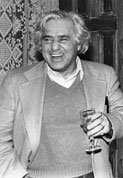Layton's final stanza

Courtesy McGill Archives
On January 4, Montreal lost one of its favourite sons when poet Irving Layton died at the age of 93. An officer of the Order of Canada (1976) and a Governor-General's Award winner (1959), Layton was a graduate of Macdonald College, and perhaps Canada's most decorated literary firebrand. His personal contribution to both our national canon and our city's estimable relevance within it promises to be celebrated for some time.
Of Layton, Leonard Cohen has famously said "I taught him how to dress, he taught me how to live forever." Cohen was but one high-profile McGill alum present at Layton's funeral Sunday, January 8, as were Justice Minister Irwin Cotler and CityTV co-founder Moses Znaimer. All three were friends and former students of Layton's, and all spoke at his funeral.
Doubtless, there are those who will remember Layton as a controversial figure, and such a position is not wholly unwarranted. He was a fierce social and political critic whose detractors often cite his audacious bluster and unapologetic and sometimes unpopular opinions. He had a contentious relationship with the generations of poets that preceded him and his ilk who espoused a departure from British influences.
McGill English literature professor Brian Trehearne remembers Layton.
"I think Layton's legacy should be that of a poet who held to a vision of poetry's great power and who tried to exemplify that power in his own very public role. He recognized viscerally all the forces that were reducing our freedom in the modern world and contested them. These were not only the usual human antagonists to freedom but all those natural forces that conspire against us: age, disaster, erosion, decay, above all Time. He should be remembered as one who responded to Time by trying to bring enormous dynamic and vital energy into his poems: into their vernacular idiom, into their rhythms, into their shapely and sometimes wholly unshaped stanzas. At his best he was the finest craftsman of his time."

